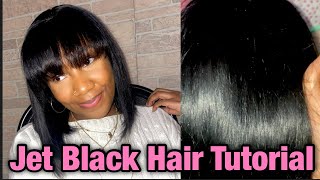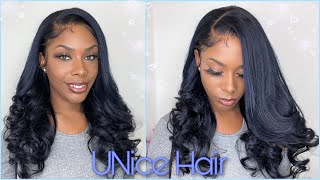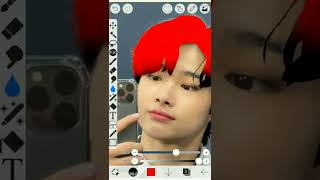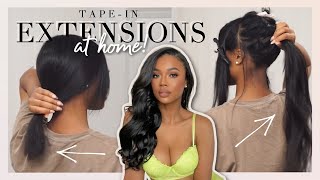Society'S Views On Black Women'S Hair
Essence Harden, Lisa Picot-Hebert, Jordyn Holman and Miki Turner join The Current's Cindy Robinson for a panel discussion on black women's hair and the pressure to conform.
There has always been pressure for women to look a certain way. Over the last few years, women in the african-american community have started embracing their natural hair, a look that is not always accepted among society. Today, we're joined by a panel of professional women to discuss why black women in their hair is such a big conversation. Ladies, thank you for joining us. Can I have you each introduce yourselves and let us know what you do. I'M essence hardin. I am a PhD student at UC Berkeley in the Department of African American Studies, and my dissertation is about black mask unity and hairstyling practices. My name is Lisa Pico a bear. I'M a professor here at Annenberg and my research area is gender body image in the media. My name is Jordan, Holman, I'm a journalism student here and I'm a senior and my name is Mickey Turner and I'm a professor here at Annenberg and I photograph people who have hair okay, so Jordan, I want to start with you. Can you please explain what natural hair is for those that may not know exactly what that means, at least among the black community yeah? Definitely so for a black woman wearing your hair natural, what mean washing it and not straightening it afterwards or manipulating it in any way with like chemicals or heat, and so for african-american women. That means our hair is curly. Do that, okay and Lisa? I want to ask you just because I know you have maybe a little different take on what natural hair is, because I know you consider yourself natural right. I think natural hair is anything. That'S just not chemically touched, so I have no chemicals in my hair, but I definitely flat iron, my hair, so I consider it natural cuz, it's all mine, okay, so as african-american women in professional settings do you feel the pressure to conform and why I'm gon na Start with essence, ya know: cuz, I'm a graduate student, and I think that my department in particular, has a lot of people who are women who have their hair and a more natural like state. So it hasn't been any sort of issue, and my hair also is long, and they know that when I shaved my head when I started my locs and that was a certain different space was also a teenager. But there are people in my department, for instance, who are women who have really short, hair or bald heads, and when they go in the market, they always grow their hair out. And I think that's a really interesting idea. But me personally, because my hair has like reached a certain length below my shoulders. I haven't really felt the need or the pressure to do anything in particular with it Lisa. What about you? Well, I think, speaking as a broadcast journalism, professor, there are certain ways that hair needs to look in this in this. Unfortunately, in the society, I think we haven't gotten past, especially for african-american women. We haven't gotten to the point where you see many women with dreadlocks or or curly hair or outside of the standard bob sort of cut. So I think it all. It depends on the type of career that you go into in academia. We can do whatever we want when we're teaching it, but if you're gon na be on-air in particular you you have to conform. The statists aasai Atal standards, Jordan. What about you? I would definitely say there is pressure just because I'm coming from it as a student. Definitely in college is less so, but just thinking about how I'm gon na wear my hair for internships or how people are going to perceive me when I go on the job search, I feel like there is like the pressure that other people have talked about here. On this panel, but I feel like that's changing and it's also very regional, sometimes I feel make you it about you. Well, ironically, you know. I'Ve got my two sisters here from Berkeley and when I was at Berkeley doing a fellowship, I woke up one morning and shaved my head, but I've just never liked to do hair, so I cut it all off and there was like this instant reaction. That was just like yeah and I wore it like that for probably 10 15 years, and the only reason I changed it over is because I kept getting stopped by police when I was driving, because I think they thought I was a guy. So I said I'm just gon na like do this lock thing cuz, I don't like to do hair. So, do you feel that main african-american men that have hair do you think there's different standards for them as far as what is expected of how they do their hair? Are they allowed to say, do dreadlocks and be on television Lisa or you know we have Jodi Armour here, one of the professor's. He wears a big afro and he does get a lot of attention here. Do you think it's a different standard for men um to be honest with you? No, they may get away with a little bit more, but men still have to conform. You'Re not gon na see a man come on with a full beard right I mean that's good, that sort of their hair space, so they're still, unfortunately, ways that men have to conform if you're an athlete and you're doing play-by-play. Yes, you can have that fauxhawk, but if you really are gon na work for ESPN, that's not gon na. That'S not gon na work out very well for you and you know at my alma mater Hampton at the business school they will not allow the men or anyone to wear dreadlocks, cornrows or anything. You can't even be in that school and have you know this type of natural hair? So that's the message they're sending out there and I you know I personally think that's wrong, but they're saying in the world of business. These people won't be accepted. So I you know: I've not worked in corporate America since the 80s, so I don't know if that's still that's a black school. Yes, innately see you saying sending out that message, yeah, so so you've talked about a lot of what you've seen like you said. That was in the 80s. Have you seen change since then, as far as how his hair is accepted, accepted yeah? I don't think anybody looks twice it. You know people with twists or dreadlocks or whatever they're doing these days or this natural do. That goes all over. The place, I think it's become quite the norm now, if that gets you a job somewhere, I don't know, but I think it's been accepted mostly by the mainstream as it's just another hairdo. So I'm pretty sure each of you have personal experiences that you've dealt with with your hair, Jordan. I know you blogged about some doors. We definitely want to hear your take on what you've gotten from dealing with your hair. Starting with essence, have you ever dealt with anything that made you uncomfortable about your hair or like somewhat something someone said in in the work setting or in society period, yeah, mm-hmm kind. I remember well when I shaved my head, my mother cried when she saw me after not having like hair anymore and I, and that was 2,000, so it was a while ago, but I remember it because you know it was pretty dramatic. Her response, when my hair was shorter and it was growing out, you know like locs, it's a strange transition and we're like your hair, looks kind of funky and maybe jacked up and like you're, not washing it all the time. So you look kind of like drastic and I think in those moments I felt a little uncomfortable, so my hair was covered up mostly like I didn't really wear my hair out until maybe a few years ago, when my hair texture also doesn't like lock that easily. So you know the longer it got the easier it became, but I think I had to get comfortable sort of like with what my hair looked like and it took a really long time because it's just you know it's different layers. It looks crazy. Sometimes it looks good, I don't like doing my hair also, so I will look like ragamuffin all the time today, of course, so that kind of those responses are when my hair looks really tightly twisted and like fresh and clean, and I do think I experience a Type of dissidence, when my hair is a little more more more wild and free, actually like a dreadlock, it's supposed to be technically right, well, you're not really doing much to your hair you're, just letting it kind of do its thing Lisa. What about you? You know! I have it's interesting because when I do my hair is extremely curly and and when I wear it, what I consider non flat, ironed or blow-dry. Everyone says: oh, my god, I love your hair and then they want to touch it and it's so curly, and why don't you wear it that way and what I really don't. The reaction I don't like is the direction I get from African Americans, because then they use what you know Chris Rock sort of brought out to the to the sphere of oh, my god. You have that good hair. Why don't you ever deal with it and I'm like? Well, I don't it makes me look young, it doesn't make me feel professional and it's what I call my beach hair. It'S my it's. My summer hair. I said you know I already have a problem. As a woman feeling like I want to be taken seriously in the workplace, if I come in looking like Jordan, which is cute as a professor, I just feel like people are going to not take me as seriously, because I look very young. So I just don't like that whole whitening of the hair for me, because it then gives off a different connotation to people because of my hair texture, okay, Jordan. I know you wrote a blog about some experiences that you have had, especially specifically something in London. Can you elaborate on that yeah, so I was in London last or spring semester when I studied abroad and kind of echoing what everyone else said. Taking care of our hair takes a lot of time like you have to think about it, and what not I didn't want to have to do that abroad. So I wore my hair and braids when I first went over there and then there comes a time you have to switch up your hairstyle. So I did that and I like wash my hair and like wore it as an afro. Just because I was the easiest thing so then I went to class the next day after my professor, having seen my hair and braised for nine weeks, and she straight up just did not know me. She was like who is this girl who's like coming into my class midway more than midway through the semester, and it was really awkward because she stopped the class like just to ask like who I was and then she, when she finally realized it was my hair That, like kind of confused her she's like oh well, your hair looks great and it was it's so like maybe hearing that story, people like oh, it turned out like she liked your hair, but it was this very uncomfortable. I'Ve like been struggling with how to wear my hair and just to like make that a public conversation was just very uncomfortable. So just echoing off of like changing your hairstyle is a very personal thing for African American women. It'S very personal for me, and so when people kind of attribute personality traits or who you are based off of your hair, it's really difficult because you're like I'm, not trying to make a statement, I'm just trying to do what's best for me and what's easiest for Me it's very linked to your identity. Yeah yeah, I mean you know my thing was I'm a swimmer and a diver, so I couldn't like really have the perm here, all the time cuz I wasn't working for a sister, I mean you know. I want to go in and look like this when I get out, I wish I took better care of my hair. I really like you know. I don't put anything on it. I rarely wash it you know it's just I get up and go so. There are probably things I could be doing. It probably could look a lot healthy than it looks now, but uh oh well I'll, come over and help you Mickey. Thank you all for joining me today. It was great great conversation. We can continue this conversation on USC Annenberg, Mediacom





Comments
Southern Playero: I'm glad I watched this video . The ladies were very sincere with their comments . Very educational . Thank You .
Ed The Bank: I understand what the woman with straight hair saying but the only way for this to change is for us to challenge the system. I'm glad more people are wearing their natural hair; having to change your appearance to fit in always bothered me because no one else have to make changes to this degree in society.
Global Go Getter: Stop worrying about "societies view" if YOU dont embrace and respect yourselves as NATURE made you, society too will never respect and/or embrace you. You are ALREADY beautiful.
Lucia D: Wish the host would comment on her weave. Nothing natural about her hair.
Noel Wautchuns: I rarely wash it rotfl